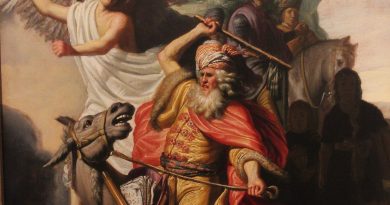Balak 5769 — Free Will and Talking Donkeys
 What does the prophet say to his donkey? “And Balaam said to the ass, Because you have mocked me; I wished there was a sword in my hand, for now would I kill you.” Of course, what’s even more interesting is that it was the donkey that opened the conversation!
What does the prophet say to his donkey? “And Balaam said to the ass, Because you have mocked me; I wished there was a sword in my hand, for now would I kill you.” Of course, what’s even more interesting is that it was the donkey that opened the conversation!
This is one of my favorite stories in the Torah: Balaam, the non-Jewish prophet, and his talking donkey.
Just think of how many different lessons we can learn just from outline of the story!
First of Balaam is a prophet — he speaks to God, God appears to him. And he is NOT Jewish. This is a hugely important lesson. One of the great novelties of the founding fathers of Judaism was the idea that there was one God who was in charge of everything — the whole world, the whole universe. In our prayers we call God “koneh hakol,” the creator/possesor of everything. So it’s only logical — if God is God to the whole world, he would speak to others, not just our particular group, even if we do feel we have a special relationship with the Creator.
This non-exclusivity is a very important and fundamental religious concept. I am very troubled by some of the more fundamentalist branches of Christianity that maintain if you don’t believe the right way (like them) you will go to Hell. If God is God to everyone, doesn’t He love and accept all his children? How could the God of Everyone punish someone for an accident of where they were born? Exclusivity to one group of people is definitely totally contradictory to the idea of “the God of the Universe.”
And our non-Jewish prophet has a talking donkey. What’s more, the donkey has a clearer vision of reality at times than the prophet does: when there is an angel of the Lord standing in the road with a sword in his hand, ready to attack Balaam, Balaam is clueless. It’s the donkey who sees the angel, and saves the ungrateful prophet’s life by turning away from the sword-wielding angel.
There are important messages in this episode as well. Even prophets can have blind spots, can miss things that might be obvious to others. It’s worth keeping this in mind as we consider our earthly leadership — presidents and prime ministers are no more immune to blind spots than prophets.
And the fact that it’s a donkey that shows the prophet reality — I guess we need to be open to having the truth pointed out to us from the most unlikely of sources. Of course, any parent has gained tremendous insights through the eyes of his/her children. So we are not surprised at learning and perception being able to come from seemingly humble sources.
There’s also an interesting lesson about free will in the tale of Balaam the prophet: he can’t curse the people in the name of God, because God doesn’t want them cursed — he keeps giving them blessings. But the midrash tells us that even though Balaam knew that the Jewish people were in favor in the eyes of God, he was able to use his free will and give the wicked king Balak advice that Balak was able to use against the Jews. Of course, it might not have been smart for him to do that, as he later got his come-uppance. But he did have the free will to go against what he knew was the will of God.
May we all use our free will in line with the will of God, not in opposition to it!
Shabbat Shalom,
Reb Barry

